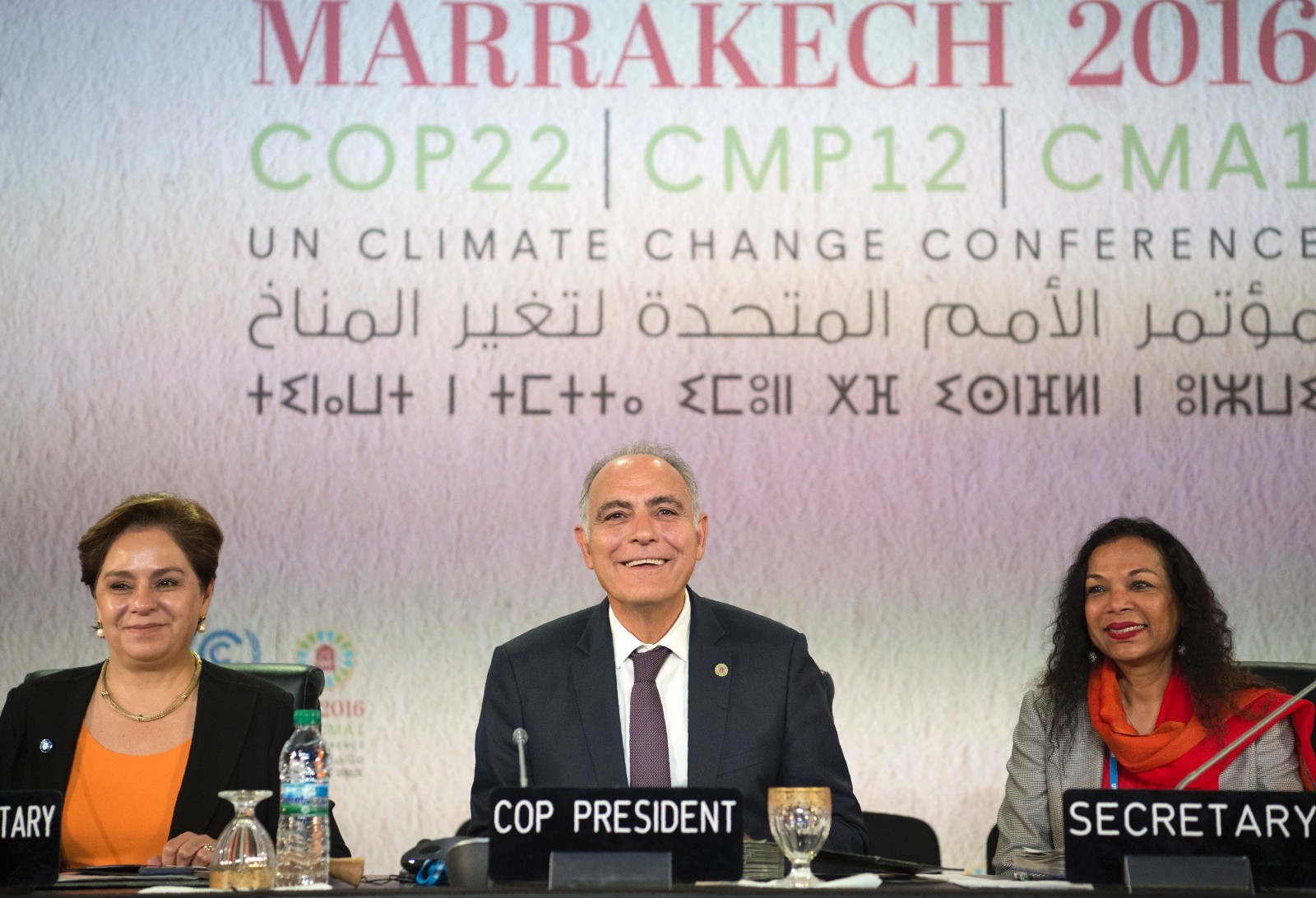The Marrakech Action Proclamation represents a crucial show of solidarity in uncertain times, but it won’t foot developing countries’ adaption bills.
By Kate Wheeling

COP22 president Salaheddine Mezouar (center) and UNFCCC Executive Secretary Patricia Espinosa (left) at the COP22 climate conference in Marrakech, Morocco, on November 17th, 2016. (Photo: Fadel Senna/AFP/Getty Images)
A haze of red dust and uncertainty has hung in the air during the United Nations climate talks in Marrakech since the United States election last week. It’s still unclear whether the U.S. will follow through on its climate commitments under President-elect Donald Trump, but, on Thursday, COP22 President and Morocco’s Foreign Minister Salaheddine Mezouar delivered the Marrakech Action Proclamation, a document that reaffirms the world’s commitment to the Paris accord.
“We welcome the Paris Agreement, adopted under the Convention, its rapid entry into force, with its ambitious goals, its inclusive nature and its reflection of equity and common but differentiated responsibilities and respective capabilities, in the light of different national circumstances, and we affirm our commitment to its full implementation,” Mezouar said.
After the reading, Mezouar joined hands with others on stage, including UNFCCC Executive Secretary Patricia Espinosa, and all raised their arms in celebration. The proclamation was a show of solidarity, and a clear message that, if the U.S. were to pull out of the Paris Agreement, it will be walking a solitary road. “We know that the international community and global peoples’ movements will move forward with or without full U.S. involvement,” Osprey Orielle Lake, the executive director of the Women’s Earth and Climate Action Network International, said in a statement Friday morning. “However, should the U.S. rescind on its Paris Agreement commitments, it will risk becoming a pariah state, and will show itself to be opposed to justice, peace, and the very life of future generations.”
Still, for many civil society organizations, the proclamation, while a welcome reassurance, didn’t go far enough. For what was billed as the “COP of action,” it’s a lot of familiar talk. The commitments included in the proclamation are hardly new — calls for higher ambition, climate finance, pre-2020 action, and heightened participation from non-state actors like local governments and the private sector, among other things.
“It is useful to re-emphasize and underline that, yes, in spite of a major setback, we will walk together and move ahead,” said Harjeet Singh of ActionAid. “But it’s also important to say how.”
Lake noted that the proclamation, like the Paris Agreement itself, is not legally binding, and “represents goals that we have yet to see negotiators and members states put urgent and ambitious action behind given the rapid increase of global warming.”
“The Marrakech COP was supposed to be an ‘action COP’—an implementation COP,” he says. “It was not supposed to be ‘what’; it was supposed to be ‘how.’ When we look at the big pieces on pre-2020 action, on finance, the ‘how’ part is totally missing.”
Indeed, Friends of the Earth International’s Meena Raman told reporters on Friday that developed countries are still “dragging their feet.” Discussions over long-term climate finance—and, more specifically, the $100 billion that developed countries have promised to provide by 2020—are still ongoing. There is significant disagreement between developed and developing nations over whether or not developed countries are on track to deliver on that promise.
“There was an attempt here to introduce a report by the U.K. and Australia, which actually was a pretense to show that they are on track, and all of us know that they are not on track,” Raman said. “The numbers are being fudged, the methodology is flawed, and the developed countries are way way short.”
“[There is] no point celebrating for something that cannot be delivered,” she added, before leaving the press conference early to get back to the finance discussions.
Developing countries are demanding more details on how, exactly, developed countries plan to achieve that $100 billion goal, citing estimates that, at most, only something like $26 billion is on the table from rich countries. “Developing countries have put forward text on scaling up, knowing how inadequate it is. Developed countries have bracketed the whole text on scaling up,” Singh says; in other words, long-term finance is still in limbo, and could even delay the conclusion of the conference. “That’s where things are hanging right now, so we will see what happens in the next few hours.”





